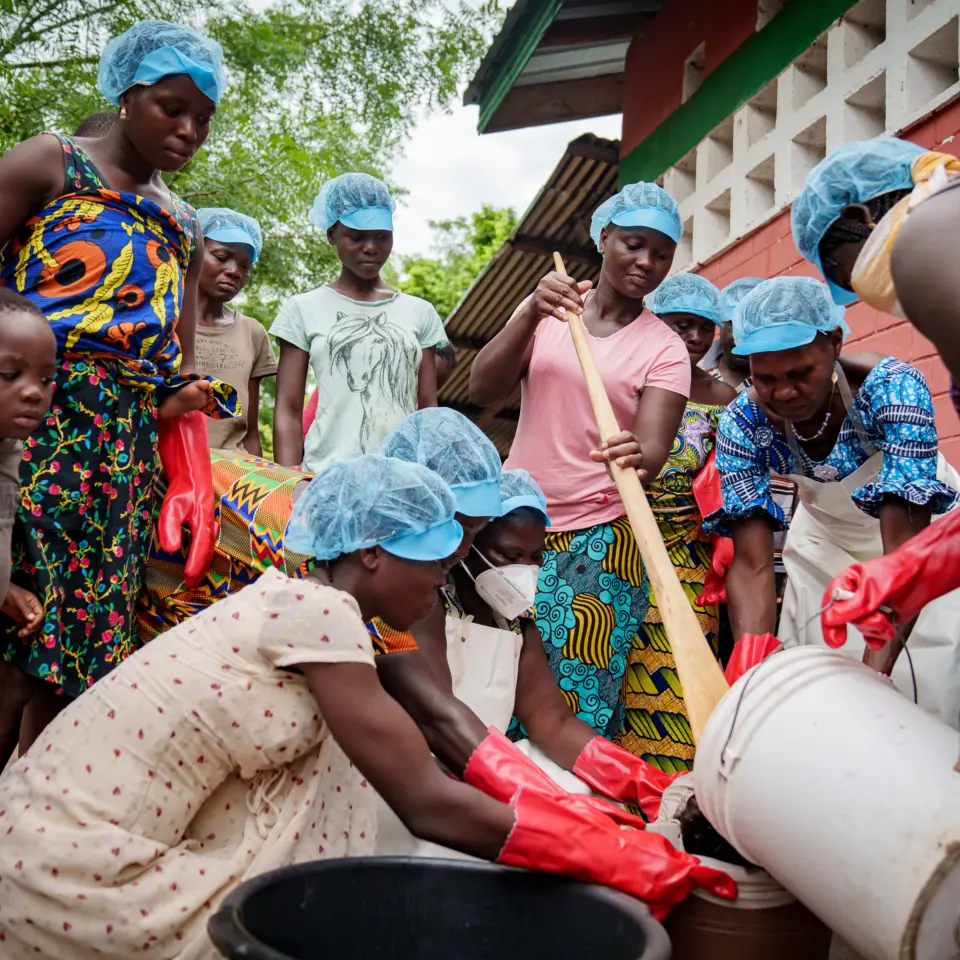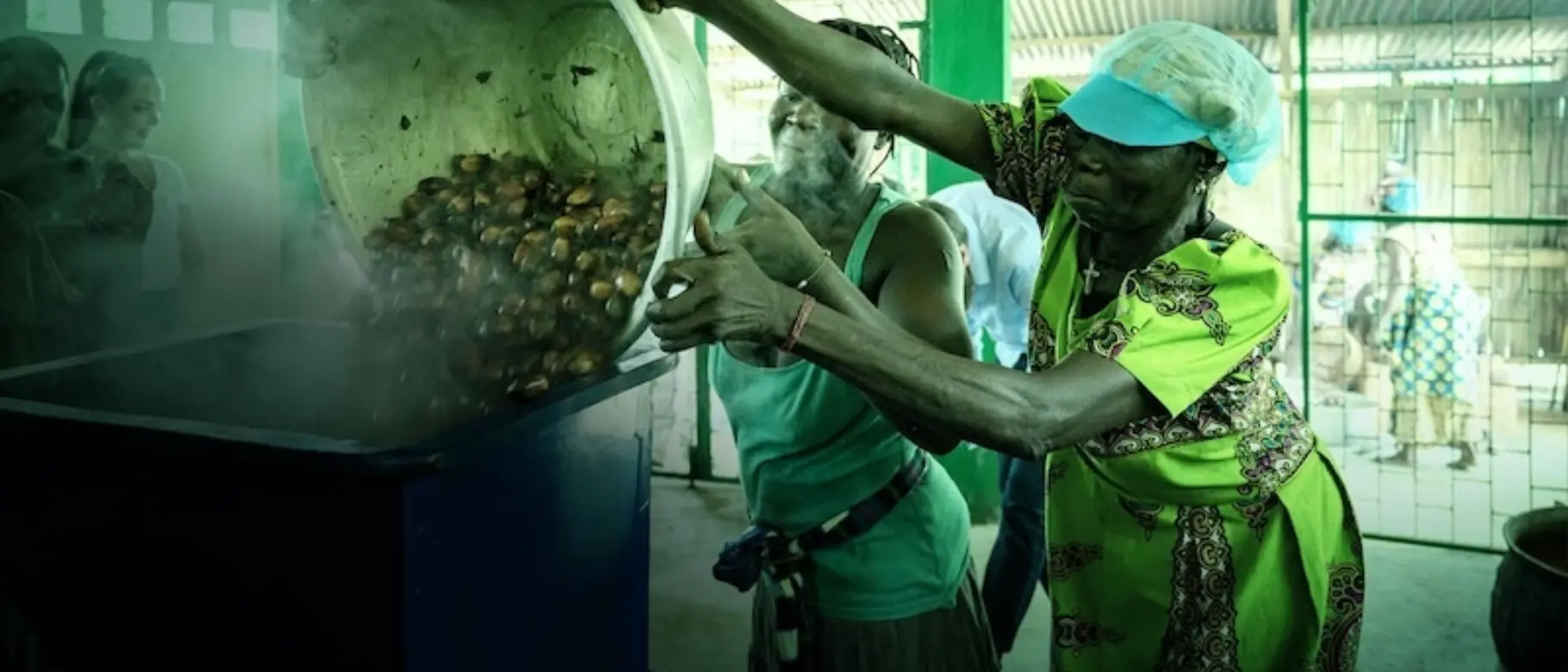
Climate projects
PROJECT TOGO
PROJECT TOGO connects your contribution to climate projects with real impact. Forest, education and opportunities for people and climate.

Looking beyond the horizon of the familiar reveals a world in which daily life is characterized by different rhythms, needs and challenges. In Togo, West Africa, people experience a life that, despite some parallels to our own in Europe, is so different in so many ways. In the villages, electricity and running water are not a matter of course, families share a room in small mud huts, and work consists largely of manual activities such as growing and harvesting their own fruit and grain. This series of articles is intended to give you an insight into the everyday lives of the people in our PROJECT TOGO. We would like to start with the story of Madame Mobo from Kotokopé.
In the rural village of Kotokopé in Togo, West Africa, where life is determined by the sun and the seasons, Madame Akou Mobo plays a central role. As president of the natureOffice women's cooperative, a group of dedicated women who engage in various activities such as palm oil and soap production, she symbolizes the tireless spirit of her small village.
She confidently declares that she is 50 years old. With a proud posture and a smile that testifies to a deep experience of life, Madame Mobo embodies the strength of the women in Kotokopé, which has around 100 souls and is tucked away in the vastness of Togo.
>> In Togo, people can become quite embarrassed when you ask their age, because many of them don't actually know exactly how old they are. And if you ask them how old their parents are, they often react with laughter. Because the assumption that a person knows their own age is already quite daring, but to expect someone to know the age of their parents seems simply unrealistic. It is rather rare for older people to have an original certificate or even just a copy of their birth certificate. <<
Originally from the town of Vogan, Madame Mobo moved to Kotokopé because her husband has relatives here. Today she lives in a typical Togolese mud house that she has rented. At night, the two rooms of her house become the common sleeping quarters for her family, which unites three generations under one roof.
Her kitchen is nothing more than a small hut made of bamboo, covered with palm leaves and located outside the house. There she cooks on an open fire that she lights with wood from the surrounding area. Over the years, the smoke from the fire has turned the ceiling of the kitchen black. Chickens and ducks scurry around freely and peck at leftover food on the floor.
>> For health reasons, most cooking in Togo is done outdoors. Nevertheless, it is important to ensure that food such as fish is kept in a hanging basket or a "guard manger" to prevent passing goats or dogs from helping themselves to it. As most people in rural areas do not have a fridge, smoked or dried fish is often used in sauces. If they have access to meat, it is usually cooked shortly after butchering to preserve freshness. Meat is also often cooked in a sauce for a longer period of time to minimize the risk of bacteria or contamination. <<
Although she never had the opportunity to go to school, Madame Mobo leads an active life and contributes significantly to her family's income. She grows maize, rice, beans and yams in her fields and sells the palm oil that she has produced together with the other women in the cooperative. Working on the land characterizes her everyday life. In addition to tending her fields, she is also involved in other income-generating activities. Once a week, she travels to the nearby town of Agou to buy fresh fish, which she then prepares and sells in her village.
The mornings start early for Madame Mobo, often before sunrise. Her day starts with sweeping the yard, a daily routine that reflects the social fabric and order within the village. She cooks for her family twice a day and spends most of her day in the fields or preparing meals. When asked about hobbies or leisure activities, Madame Mobo laughs and says that she has no free time.
>> Many women in Togo are so involved in their work that they hardly have any free time. With few modern conveniences, tasks that could normally be done quickly with machines take much longer. For example, most women in Togo wash not only their own clothes, but also those of their children and other family members. This work can take hours. Even though women have been doing this for many years and are therefore faster at it than beginners, it still remains a time-consuming and physically demanding task. In addition, washing clothes requires large amounts of water, which is why women often have to make many trips to wells, pumps or dams before they can even start washing. It is therefore not uncommon to see women washing their clothes at rivers or small watering holes. <<
The challenges of climate change are also being felt in Kotokopé, where erratic rainfall is disrupting the harvest. But despite the adversity, Madame Mobo dreams of a better life, a house of her own and a future in which her grandchildren might be able to make their way to school. Her perspective on Europe, shaped by stories and stereotypes, brings a smile to her lips. She knows that life has its challenges everywhere, and yet she hopes that one day the world will recognize the true diversity and strength of Africa. In Kotokopé, far from the hustle and bustle of modern cities, Madame Mobo lives her life - not without hurdles, but always with a deep love of community and an unshakeable belief in the power of cohesion.
